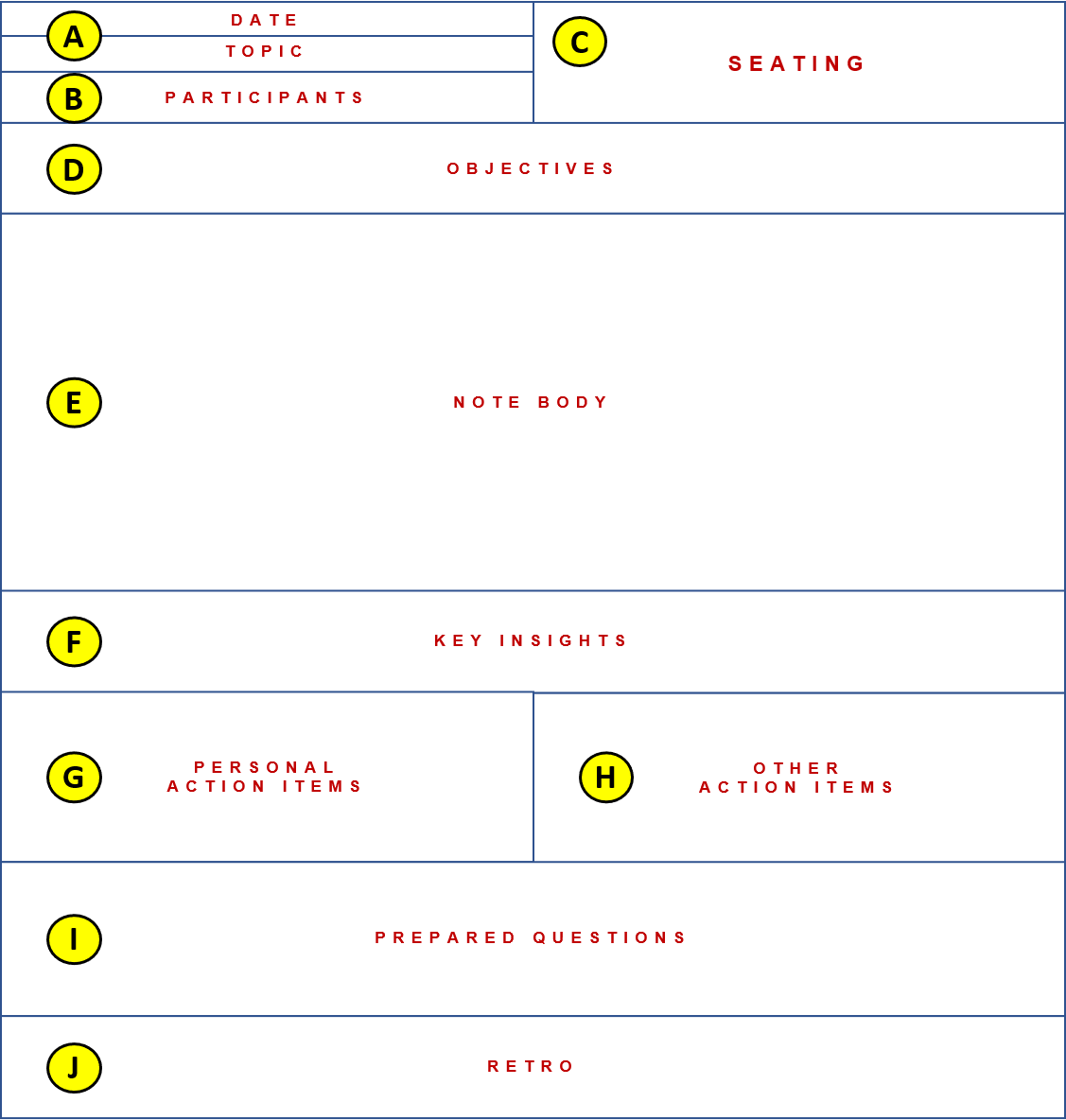Taking more effective notes

I used to take absolutely horrendous notes. And most people I encounter have similar underlying issues in regards to note taking. It’s something I noticed occasionally when working in-person, and something I have heavily noticed since the assimilation of remote work, as documents and notes are much more regularly shared with the easy doc sharing capabilities available.
Whether notes are good or bad is of course entirely in the eye of the beholder, and I by no means claim to know the be-all and end-all approach to note taking (quite the opposite). For me personally, honing my note taking skills has been a game changer. I am a learning type who benefits greatly on writing and reviewing my notes frequently, and it has made me an absurdly avid note taker both in business and in my personal life. I view it as an extremely underrated skill, and one I personally value very highly. So much so that I count myself among the cruel interviewers who confiscate the notes of the interviewee at the end of a session (or at least I did when in person interviews were a thing). It gives a really unique insight into how a person organizes themselves, structures a problem and distills the key insights.
Good notes are concise - elaborate notes a sign a helplessness
I recall vividly the second week of my first fresh-out-of-college gig as a junior consultant at a boutique consultancy in Düsseldorf. I was accompanying a senior manager to a big client (in hindsight: a huge vote of confidence from my boss). My job? Let my colleague do all the talking and just take notes. And so I did. Lots and lots of notes. Out of fear of omitting or missing important information I wrote down everything. You know those stenographic court reporters from law movies? The ones which type incessantly to protocol live testimony. That was me. And unlike the court reporters who are doing their job, I was doing myself and my colleague a huge disservice. Apart from the unstructured wall of text I produced (which needed 30 minutes of restructuring), I actually made our meeting partners close up. How would you feel if you sat across from an outside consultant and every word you uttered was seemingly documented?
Well, my colleague pulled me aside after our third meeting together and gave me a much needed talking-to. He advised me to ditch my laptop (which apart from the aforementioned keyboard-protocol-clicking, created a physical distance between our client and myself) and switch to hand written notes. Nowadays I take notes digitally almost exclusively, but it was the perfect remedy for me at that moment, as it removed the temptation of total-documentation and forced me to procure the most vital information out of a haystack of clutter.
Structuring personal meeting notes
Taking personal notes is an entirely different ball game from taking notes which you know will be shared in your team (or even with a multitude of teams). The difference starts with the used software (commonly used solutions such as Notion or Evernote usually differ from the one used in your organization internally) and determines the entire structure of your document. This post focuses on personal meeting notes, as these are the most common in my experience. Here is how I structure my meeting notes:

(A) and (D) Date, topic and objective: There is a reason you are sitting down with a person or group of people. Answering this question is the underlying goal of your meeting. Making sure the objective and/or your personal objectives of the meeting are formulated and written down ensures that the quintessential question is omnipresent in your mind. It also serves as a reminder to steer the conversation back on track if it begins to stray.
(B) Participants: Self explanatory. Who is participating in the meeting? Who actually attended and not who was invited.
(C) Seating: A relict from the past - I usually forego this. The relevance of this component is diminished with the majority of meetings being held digitally. But there will come a time when in-person meetings once again occur more frequently. A visual recollection of where which participant sat in a meeting helps me greatly, especially when meeting a high amount of news faces during a project.
(E) Note body: This is the space to jot down general notes and the meeting’s talking points.
(F) Key insights: If information of profound importance is mentioned, this is the place to write it down. These are usually "eyes light up" or "aha" moments for me. This area is your clutter filter where you store the meeting’s bottom line or facts related to your objective. The things that really made that meeting worthwhile.
(G) Personal action items: Any task or to do which arises that are your concern.
(H) Other action items: Tasks that arise during the meeting. To be completed by another participant (I usually write the initials of the owner in parentheses). This field along with G puts you in a great position for a quick recap at the end of the meeting. It really makes sure everyone is on the same page and clear on the next steps.
(I) Prepared questions: Take time to prepare for your meeting. You have questions? Write them down here, so you don’t forget to discuss them.
(J) Retro: I always try to take a minute to reflect on a meeting in the direct aftermath. Both from the substance of the content, but more importantly on the atmosphere and general vibes or certain participant behavior. Was a person really optimistic and a possible good point of contact for a certain issue? Was a participant especially hostile or confrontational? This is important, overarching information which is quickly forgotten or rationalized in hindsight.
Yes: It is very tempting to skip notetaking on occasion. It can be exhausting. But being commited to notetaking also makes sure you are 100% present in a meeting and not distracted or somewhere else with your head.
Some last tips:
- Write in a landscape. I don’t do this anymore, but I know many people who do. Give it a shot, perhaps the format will be a better fit for you.
- Please do not violate your notes with mathematical clutter. Use an extra sheet if you need to run some math on the fly.
- Use abbreviations for terms which occur frequently. General advice is tough - it really depends on which space you work in.
- Less is often more in life. Same with notes. It’s no fun having to navigate through a multi-page jungle when reviewing past meetings notes
